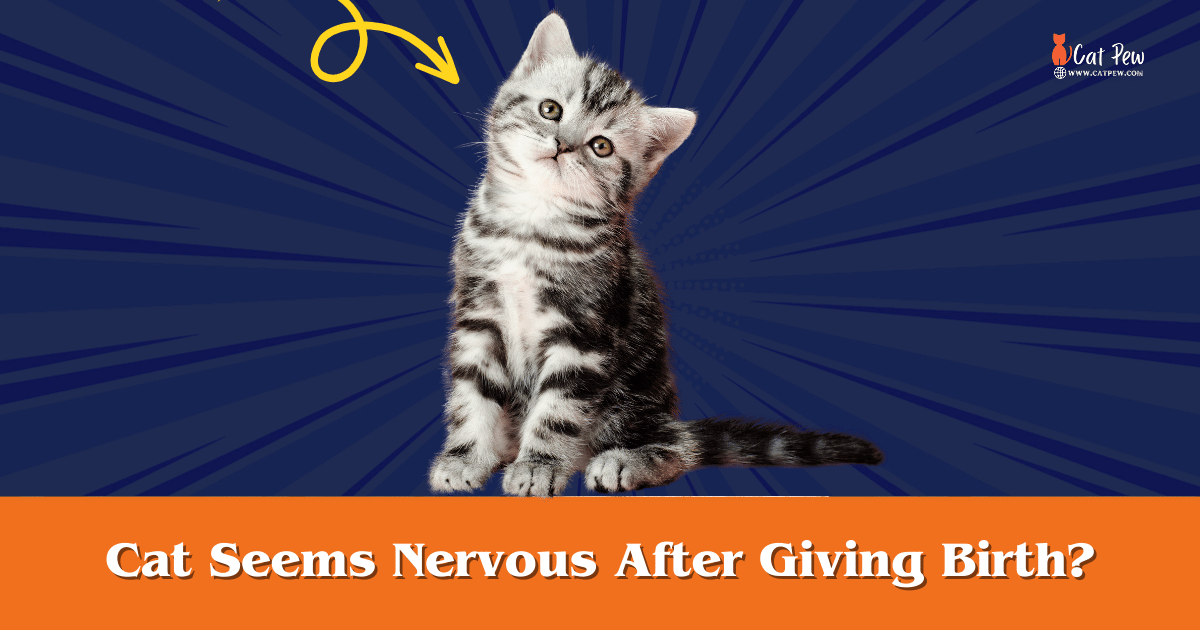After giving birth, it is common for cats to feel nervous or anxious. This can be due to hormonal changes, physical discomfort, or the stress of caring for their newborns.
Recognizing Behavioral Changes And Body Language
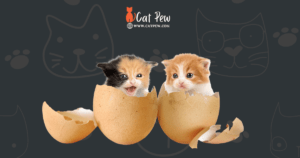
A cat giving birth is undoubtedly a significant event, both for the furry mama and her human family. While it’s normal for cats to experience some degree of nervousness during and after giving birth, it’s essential to recognize any concerning behavioral changes and body language displayed by your feline friend. Being attentive to these signs allows you to provide the necessary support and understand your cat’s needs better. Let’s delve into some of the common behavioral changes you may observe:
Increased Restlessness Or Pacing
One of the noticeable signs indicating that your cat might be feeling nervous after giving birth is increased restlessness or pacing. You may observe your cat frequently pacing around the nesting area or restlessly moving from one spot to another. This behavior could indicate that your cat is experiencing discomfort, anxiety, or stress. It’s essential to provide a calm and secure environment for your cat and ensure she has a designated space where she can feel safe and comfortable.
Excessive Grooming Or Self-soothing Behaviors
Another behavior commonly seen in cats after giving birth is excessive grooming or self-soothing behaviors. Your cat may spend an increased amount of time grooming herself, sometimes to the point of excessive or obsessive behavior. This behavior can be a result of stress or anxiety. However, it’s crucial to differentiate between normal post-birth grooming and excessive grooming that might lead to skin irritation or hair loss. If you notice any signs of potential harm caused by excessive grooming, it’s advisable to consult with a veterinarian for appropriate guidance.
Refusing To Eat Or Drink
It’s not uncommon for cats to show a temporary decrease in appetite after giving birth, especially if they are feeling anxious or unsettled. However, if your cat consistently refuses to eat or drink for an extended period, it may be cause for concern. Dehydration and malnutrition can have adverse effects on both the mother cat and her kittens. If you observe prolonged refusal of food or water, it’s crucial to consult with a veterinarian promptly for appropriate guidance and support.
Litter Box Avoidance
During and shortly after giving birth, some cats may display litter box avoidance behavior. They may prefer to find alternative spots to relieve themselves, which can be stressful for you as a cat owner. This behavior is often associated with the cat’s instinct to protect her litter and keep potential threats away. Providing a quiet, comfortable, and easily accessible litter box away from the nest area can encourage your cat to use it regularly and minimize any potential issues.
Aggressive Or Defensive Behavior
If you notice your cat displaying aggressive or defensive behavior after giving birth, it’s essential to handle the situation with care. Mother cats are naturally protective of their kittens, and feeling threatened can trigger defensive responses. These behaviors may include hissing, growling, swatting, or even biting. Ensure that you give your cat ample space and avoid interfering with her and the kittens unless necessary. If the aggressive behavior persists or becomes a concern for the safety of the family or kittens, consult with a veterinarian or a feline behavior specialist for professional assistance.
Designing A Quiet And Secluded Nesting Area
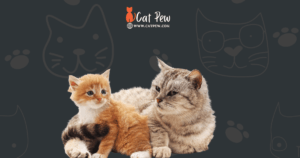
Create a calm and secluded space for your cat after giving birth to help ease her nerves. Design a quiet nesting area to provide comfort and security for your feline friend during this sensitive time.
After giving birth, your cat may seem nervous and anxious. One way to help her feel more at ease is by designing a quiet and secluded nesting area for her. Creating a space where she feels safe and comfortable can improve her overall well-being and reduce stress.
Location And Set-up Considerations
The location and set-up of the nesting area are crucial for your cat’s comfort. Here are some considerations to keep in mind:
- Find a quiet and low-traffic area in your home where your cat can retreat undisturbed.
- Ensure there is enough space for her to move around comfortably and stretch out.
- Place the nesting area in a warm and draft-free spot. Cats prefer warmer temperatures, especially after giving birth.
- Avoid placing the nesting area near loud appliances, such as washing machines or televisions, as the noise can be stressful for your cat.
Providing Soft Bedding And Familiar Scents
Creating a comfortable and familiar environment for your cat in her nesting area is essential. Here’s how you can achieve that:
- Choose soft and cozy bedding materials, such as blankets or towels, for your cat to rest on. This will provide her with a warm and comfortable surface to lie on.
- Consider using bedding that has your cat’s familiar scent on it. This can help calm her and make her feel more secure in the nesting area.
- Introduce familiar objects, such as your cat’s favorite toys or a piece of clothing with your scent, to further enhance the sense of familiarity and comfort.
By designing a quiet and secluded nesting area with careful location and set-up considerations, as well as providing soft bedding and familiar scents, you can help alleviate your cat’s nervousness after giving birth. Remember, a calm and stress-free environment is crucial for your cat’s postpartum recovery and well-being.
Minimizing Disturbances And Noise
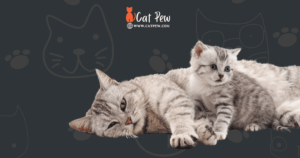
After giving birth, it is common for cats to be nervous and easily disturbed by noise. To minimize disturbances, provide a quiet and peaceful environment for the cat and her newborns, ensuring they have a safe and secure space to bond and rest.
After giving birth, cats can often become nervous and skittish. It’s important to create a calm and peaceful environment for your cat during this time to help reduce stress and anxiety. One way to achieve this is by minimizing disturbances and noise that could potentially unsettle your cat. By limiting human and pet interactions and reducing loud sounds and sudden movements, you can create a more serene environment for your feline friend.
Limiting Human And Pet Interactions
When a cat has just given birth, it’s essential to limit the number of people and pets around her. The presence of unfamiliar faces and animals can make her nervous and increase her stress levels. To keep your cat as comfortable as possible, ask family members and visitors to give her space and avoid handling the kittens unless necessary. By reducing human and pet interactions, your cat can feel secure and less overwhelmed during this delicate postpartum period.
Reducing Loud Sounds And Sudden Movements
Loud noises and sudden movements can startle a cat, causing her to become anxious and agitated. To minimize disturbances and noise, create a quiet and calm atmosphere in the vicinity of your cat and her kittens. Avoid playing loud music or having noisy appliances nearby. If there are other pets in the house, ensure they are kept in separate areas away from the new mother. Additionally, when you need to move or approach your cat, do so slowly and gently. By reducing loud sounds and sudden movements, you can help your cat feel more relaxed and at ease, promoting a peaceful postpartum environment. In conclusion, minimizing disturbances and noise is crucial for the well-being of a cat after giving birth. By limiting human and pet interactions and reducing loud sounds and sudden movements, you can create a calm and peaceful atmosphere that promotes your cat’s comfort and reduces stress and anxiety. Remember, providing a serene environment is essential for the health and happiness of both your cat and her newborn kittens.
Offering A Safe And Secure Hiding Spot
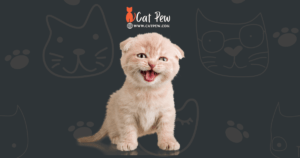
The cat seems nervous after giving birth. Provide a safe and secure hiding spot to calm and comfort her during this vulnerable time.
After giving birth, it is not uncommon for a cat to feel nervous and anxious. The whole experience of delivering kittens can be overwhelming for them. As a caring pet owner, it is important to understand their needs during this time and provide them with a safe and secure hiding spot where they can feel protected and comfortable. Creating such a space allows them to recover and adjust to their new role as a mother, while also reducing their stress levels.
Introducing Cozy Hiding Places
One way to help your cat feel more at ease is by introducing cozy hiding places in your home. These spots should be quiet, secluded, and easily accessible for your cat. Consider dedicating a specific room or corner for her, where she can retreat whenever she feels overwhelmed or needs some alone time. This area should be equipped with comfortable bedding, such as a soft blanket or a cat bed, where she can relax and rest.
Encouraging Exploration At Her Own Pace
While providing a hiding spot is important, it is also essential to encourage your cat to explore at her own pace. Some cats may feel more inclined to venture out sooner, while others may take a little longer. Pay attention to your cat’s body language and allow her to come out of her hiding spot when she feels ready. Avoid forcing her to interact with her surroundings or the kittens if she is not comfortable yet. Let her explore gradually, providing reassurance and support whenever needed. It is crucial to note that during this period, your cat may seem more cautious and timid. Loud noises or sudden movements can startle her easily. Maintain a peaceful and calm environment around her, minimizing any potential stress triggers. Avoid having guests over or playing loud music until your cat has fully adjusted to her new role as a mother and her kittens have grown older. In conclusion, offering a safe and secure hiding spot for your cat after giving birth is key to helping her feel more secure during this vulnerable period. Introduce cozy hiding places and encourage her to explore at her own pace, ensuring a peaceful and stress-free environment. Remember, each cat is unique and may take different amounts of time to adjust, so be patient and supportive throughout the process.
Establishing A Consistent Daily Schedule
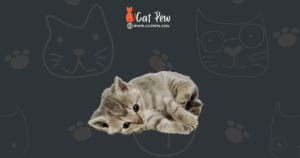
Establishing a consistent daily schedule is crucial for a cat that seems nervous after giving birth. The hormones and stress involved in the birthing process can leave a cat feeling anxious and uncertain. By creating a structured routine, you can help your cat feel more secure and confident in her new role as a mother. This blog post will explore two important aspects of establishing a consistent daily schedule: regular feeding and playtimes, and routine sleep cycles.
Regular Feeding And Playtimes
Feeding your cat at the same time every day not only helps her feel more secure but also ensures that she is receiving the essential nutrients she needs to recover from giving birth. A consistent feeding schedule helps regulate her digestive system and promotes overall well-being. Consider creating a feeding area in a quiet corner of your home where your cat can eat peacefully without any disruptions. Place fresh water nearby as well to help her stay hydrated.
In addition to a regular feeding schedule, it’s equally important to establish consistent playtimes for your cat. Play helps alleviate stress and anxiety, and it also promotes bonding between you and your cat. Schedule multiple short play sessions throughout the day, focusing on engaging toys that encourage your cat to chase, pounce, and jump. These interactive play sessions will not only provide physical stimulation but also mental stimulation, helping to divert your cat’s attention from any nervousness she may be experiencing.
Routine Sleep Cycles
Sleep is vital for a cat’s overall well-being, especially during the post-birth period. Establishing a routine sleep cycle will help your cat feel safe and relaxed. Cats are naturally crepuscular, meaning they are more active during dawn and dusk. Therefore, try to create a quiet and cozy sleeping area where your cat can rest undisturbed during the day and night. Consider providing a soft bed or a quiet corner with blankets where she can curl up and feel secure.
It’s important to resist the temptation to disturb your cat while she is sleeping, as it may disrupt her sleep cycle and contribute to her nervousness. Instead, provide a quiet and calm environment, free from loud noises or sudden disturbances. Maintaining a consistent sleep routine will help regulate your cat’s energy levels and contribute to her overall well-being.
Implementing Stress-reducing Activities
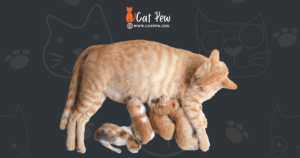
Reduce stress after giving birth by implementing stress-reducing activities for your nervous cat. Engage in gentle play, provide a calm environment, and offer comforting sessions of massage or brushing to help alleviate anxiety.
Implementing stress-reducing activities is crucial for a cat that seems nervous after giving birth. Creating a calm and soothing environment can help the new mother relax and focus on caring for her kittens. Two effective stress-reducing activities are environmental enrichment and interactive toys, as well as gentle massage and positive reinforcement training.
Environmental Enrichment And Interactive Toys
One way to alleviate stress in a nervous postpartum cat is to provide environmental enrichment. This involves ensuring that the cat’s surroundings are stimulating and engaging. Cats are natural hunters, and by providing them with interactive toys, we can help redirect their energy and keep their minds occupied. An interactive toy like a puzzle feeder or a treat-dispensing toy can stimulate the mother cat’s problem-solving skills and provide mental stimulation. These toys can be filled with treats or kibble, encouraging the cat to work for her food and keeping her engaged. In addition to interactive toys, consider providing scratching posts, climbing trees, and hiding spots. These items help to satisfy the cat’s instincts and provide a sense of security. Creating vertical spaces, such as shelves or cat trees, can also help the cat feel more comfortable and reduce stress.
Gentle Massage And Positive Reinforcement Training
Gentle massage is an effective way to relax a nervous postpartum cat. It helps in reducing muscle tension and promoting a sense of calmness. Start by gently stroking the cat’s fur and gradually increase the pressure if the cat seems to enjoy it. Always be observant of the cat’s body language and stop if the cat shows signs of discomfort. Positive reinforcement training can also help reduce stress in a nervous cat. By using rewards such as treats or praise, we can reinforce positive behaviors and create a positive association with certain activities. Training sessions should be short and frequent to prevent overwhelming the cat. Start with basic commands like sit or stay and gradually progress to more complex tasks. Remember, it is essential to be patient and gentle when implementing stress-reducing activities. Every cat is unique, and it may take time for your cat to adjust and feel comfortable. By providing environmental enrichment and stimulating toys, as well as offering gentle massage and positive reinforcement training, you can create a soothing environment for your nervous postpartum cat.
Utilizing Natural Calming Aids

Ease your cat’s postpartum anxiety with the help of natural calming aids. These remedies can help soothe your nervous feline and promote a sense of calm after giving birth.
Pheromone Diffusers And Sprays
One natural way to help calm a nervous cat after giving birth is through the use of pheromone diffusers and sprays. These products are designed to mimic the pheromones that mother cats release to create a sense of security and relaxation for their kittens. By utilizing pheromone diffusers or sprays, you can help your cat feel more at ease in her environment.
When it comes to pheromone diffusers, the most popular brand is Feliway. Feliway diffusers plug into an electrical outlet and release synthetic pheromones that are calming to cats. These diffusers should be placed in the areas where your cat spends the most time, such as the room where she gave birth or where she prefers to relax.
If diffusers aren’t feasible for your situation, consider using a pheromone spray. A Feliway spray can be applied to bedding, furniture, or other items in your cat’s environment to provide an extra dose of calmness. When using a spray, be sure to follow the instructions on the packaging and avoid spraying directly on your cat.
It’s important to note that while pheromone diffusers and sprays can be effective in helping to calm a nervous cat after giving birth, they may not work for every cat. Each cat is unique, and it may take some trial and error to find the right solution for your furry friend.
Herbal Remedies And Supplements
In addition to pheromone diffusers and sprays, another natural option to consider is herbal remedies and supplements. Some cats may benefit from the calming effects of certain herbs and supplements, helping them feel more relaxed and less anxious.
Chamomile is a popular herb known for its calming properties. You can brew a cup of chamomile tea and allow it to cool before adding it to your cat’s water or food. Alternatively, there are chamomile-infused treats specifically designed for cats available in pet stores.
Another herb to consider is valerian root. Valerian root can be found in supplement form and has been used for centuries to promote relaxation and reduce anxiety in both humans and animals. You can follow the dosing instructions on the supplement packaging to ensure your cat receives the appropriate amount.
If you prefer a more convenient option, there are also over-the-counter herbal calming remedies available for cats. These products typically contain a blend of herbs known for their calming properties, such as chamomile, valerian root, and lavender.
Before introducing any herbs or supplements to your cat’s routine, it’s essential to consult with your veterinarian. They can help determine the appropriate dosage and ensure that any herbal remedies or supplements won’t interact with any other medications your cat may be taking.
Encouraging Bonding And Maternal Instinct
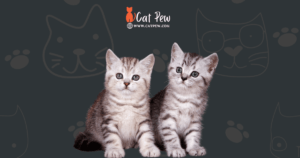
When a cat gives birth, it is not uncommon for her to experience feelings of nervousness or anxiety. This can be attributed to the hormonal changes and the overwhelming responsibility of caring for her newborn kittens. As a cat owner, it is important to understand and support your cat during this delicate period. By focusing on gentle handling, socialization, and promoting skin-to-skin contact, you can help strengthen the bond between your cat and her kittens, while also fostering her maternal instincts.
Gentle Handling And Socialization
One of the key aspects of encouraging bonding and maternal instinct in your cat after giving birth is through gentle handling and socialization. It is important to create a calm and secure environment for your cat and her kittens. Avoid sudden movements or loud noises as this can easily startle her. Instead, try to establish a consistent routine that includes regular but brief interactions with your cat and her kittens. This will help her become more comfortable with your presence and create positive associations with you.
Allow your cat to become familiar with your scent by gently stroking her and using the same hand lotion or perfume each time you interact with her. This will help to build trust and familiarity. Additionally, introducing positive experiences such as providing treats or engaging in play sessions near the nesting area can further reinforce positive associations and create a bonding experience between you and your cat.
Skin-to-skin Contact And Bonding Exercises
Skin-to-skin contact or kangaroo care is not only beneficial for human infants but can also have a positive impact on a cat and her kittens. This practice involves placing a cloth or towel that has been warmed up by your body heat between you and the kittens. The warmth and gentle pressure simulate the feeling of being close to their mother, promoting a sense of security and physical bonding.
In addition to skin-to-skin contact, there are other bonding exercises you can try. One such exercise is gently stroking the kittens with a soft cloth or your hand. This mimics the grooming behavior of their mother and helps to strengthen the bond between them and their human caregiver. Another exercise involves providing gentle massages to the mother cat, which can help release tension and reinforce the bond between her and her kittens.
Remember to be patient and give your cat and her kittens time to adjust to these bonding exercises. Each cat is unique and may require different approaches. By providing a nurturing and supportive environment, you can help your cat overcome her nervousness after giving birth and encourage the development of strong maternal instincts.
Building Trust Through Positive Interactions
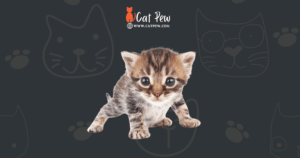
To build trust with a cat who seems nervous after giving birth, it is important to focus on positive interactions. By using rewards and treats for good behavior and consistently providing reassurance and soothing words, you can help your feline friend feel more at ease during this vulnerable time. With a little patience and understanding, you can foster a stronger bond with your cat and help her navigate this transitional period with confidence.
Using Rewards And Treats For Good Behavior
Rewards and treats can be powerful tools when it comes to reinforcing positive behavior in your cat. By offering a tasty reward whenever your cat displays calm and relaxed behavior, you are not only incentivizing her to continue behaving in this manner but also associating positive emotions with your presence. Treats can be given during and after positive interactions, such as when your cat allows you to pet her or when she responds positively to your attempts at play.
Consistent Reassurance And Soothing Words
Consistency is key when it comes to reassuring a nervous cat. By providing a steady stream of soothing words in a calm and reassuring tone, you can help your cat feel more secure in your presence. Amid her anxiety, hearing your familiar voice can provide a sense of comfort and stability. Avoid sudden movements or loud noises that may startle your cat, and instead, opt for a gentle and calm approach.
Consulting With A Veterinarian Or Animal Behaviorist

After giving birth, it is not uncommon for a cat to experience some degree of nervousness or anxiety. While a certain level of stress is understandable during this time, it is important to monitor your cat’s behavior and ensure her well-being. If you notice that your cat seems particularly nervous or anxious after giving birth, it may be beneficial to consult with a veterinarian or animal behaviorist. These professionals can provide valuable insights and guidance on how to alleviate your cat’s anxiety and ensure her overall health and happiness.
Identifying Severe Or Persistent Anxiety Symptoms
When it comes to your cat’s postpartum anxiety, it is crucial to be able to identify any severe or persistent symptoms. While a certain level of anxiety is normal, some signs may indicate a more serious issue. These symptoms include:
- Excessive panting or rapid breathing
- Persistent restlessness or pacing
- Refusal to eat or drink
- Aggressive behavior towards her kittens or other animals
- Excessive grooming or self-harming behaviors
- Unresponsiveness or disinterest in her surroundings
If you notice any of these symptoms in your cat, it is important to seek professional advice and intervention to address her anxiety and ensure her well-being.
Seeking Appropriate Medical Intervention And Advice
When dealing with a cat’s anxiety after giving birth, it is essential to seek appropriate medical intervention and advice. A veterinarian can rule out any underlying medical conditions that may be contributing to your cat’s anxiety and recommend suitable treatment options. Additionally, consulting with an animal behaviorist can provide valuable insights into your cat’s behavior and help you develop strategies to alleviate her anxiety.
Remember, a cat’s well-being is of utmost importance, especially during such a vulnerable time as postpartum. By seeking professional guidance and intervention, you can help your cat feel more comfortable and secure, ensuring a positive postpartum experience for both her and her kittens.
Exploring Medication Options
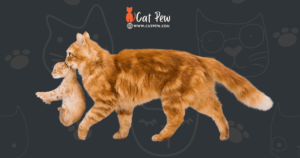
After giving birth, it’s common for cats to experience a range of emotions, including nervousness. While providing comfort and reassurance is essential, some cats may need extra help to calm their nerves. Exploring medication options can be a viable solution to support your cat’s emotional well-being during this critical time.
Prescription Anti-anxiety Medications For Cats
Prescription anti-anxiety medications are available for cats and can be a valuable tool in managing their nervousness post-partum. These medications are specifically designed to target the underlying causes of anxiety, helping to restore a sense of calmness in your feline friend.
When it comes to prescription anti-anxiety medications, it’s crucial to consult with your veterinarian before considering any treatment. They will evaluate your cat’s condition, discussing the best available options and potential side effects.
Potential Benefits And Risks
Prescription anti-anxiety medications offer numerous benefits, not only for your cat but also for you and your household. By addressing your cat’s nervousness, these medications can help create a more relaxed and harmonious environment for everyone involved.
However, it’s important to be aware of the potential risks associated with these medications. Although rare, some cats may experience adverse reactions or side effects. Your veterinarian will assess your cat’s health history and current condition to determine the most suitable medication and dosage to minimize these risks.
Some common benefits of prescription anti-anxiety medications for cats include:
- Reduced feelings of anxiety and nervousness
- Promotion of relaxation and overall well-being
- Improved bond and trust between you and your cat
- Enhanced ability to cope with stressful situations
While these benefits can significantly improve your cat’s quality of life, it’s vital to remember that each cat’s response to medication may vary. Your veterinarian will closely monitor your cat’s progress and make any necessary adjustments to ensure the best outcome.
By exploring medication options, such as prescription anti-anxiety medications, you can provide your nervous cat with the additional support they needs during this vulnerable time. Remember, always consult a veterinarian for professional guidance tailored to your cat’s specific needs.
Frequently Asked Questions Of Cat Seems Nervous After Giving Birth
Why Is My Cat Anxious After Giving Birth?
Cats may feel anxious after giving birth due to hormonal changes, stress, and the presence of new kittens. It’s important to provide a calm environment and give the cat time to adjust and bond with her babies.
Do Cats Get Stressed After Giving Birth?
Yes, cats can experience stress after giving birth, but it varies among individuals. Stress factors may include hormonal changes, lack of maternal instincts, or environmental disturbances. Monitoring the cat’s behavior, providing a calm and quiet space, and consulting with a veterinarian can help reduce stress levels.
How Will My Cat’s Behavior Change After Having A Baby?
After having a baby, your cat’s behavior may change due to factors such as stress and adjustment. Some cats may become more anxious or protective, while others may become less tolerant. It is important to gradually introduce your cat to the baby and provide them with a safe and comfortable space.
Why Is My Cat Not Playful After Giving Birth?
After giving birth, a cat may not be as playful due to physical exhaustion and focus on motherly duties. It’s a natural behavior as she prioritizes caring for her kittens. Give her time to recover and enjoy some playfulness once her maternal responsibilities ease.
Conclusion
It is common for cats to feel nervous after giving birth. This can be due to various factors such as hormonal changes, pain from the delivery, or the stress of caring for new kittens. It is important to provide a comfortable and quiet space for the mother cat to relax and bond with her kittens.
If the nervousness continues or worsens, it is advisable to consult a veterinarian for further guidance and assistance. Remember, understanding and patience are key in helping your cat through this delicate phase.

Winston
I'm Winston, the author of this feline-focused (Catpew.com) blog . My love for cats goes back to my childhood, when I spent countless hours playing with my family's tabby, Mittens. This furry friend instilled in me a deep appreciation for the unique personalities, playful nature, and unconditional love that cats offer.

